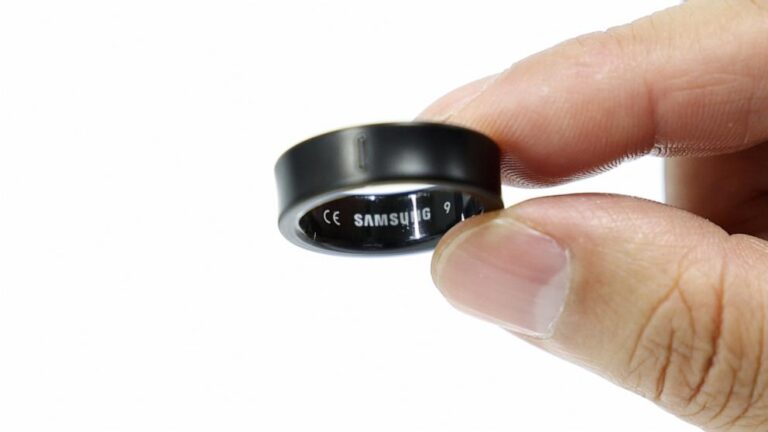Samsung is ushering in a new era of AI-powered wearable technology that aims to help people meet their everyday health needs through intelligent health experiences with features ranging from monitoring sleep behavior to tracking menstrual cycles.
The South Korea-based tech company announced an expansion of its wearables line at its Galaxy Unpacked event in Paris on Wednesday, including the much talked about new Galaxy Ring, which is end-to-end integrated with smartphones and smartwatches and can be worn 24/7.
Introducing the Samsung Galaxy Ring
The Galaxy Ring is Samsung’s latest foray into wearable devices aimed at health-conscious and tech-savvy consumers.
The sleek, compact ring features advanced health monitoring capabilities and seamless integration with the Samsung ecosystem.
Main features of Samsung Galaxy Ring
Advanced Health Monitoring: The lightweight device is equipped with an array of sensors that continuously monitor key health indicators, including sleep patterns, heart rate variability and activity levels, around the clock. That data is then analysed using Samsung’s proprietary AI and algorithms to provide users with a new Energy Score that gives detailed personalized insights into their overall health.
Biofeedback and Stress Management: One of the Galaxy Ring’s standout features is its real-time biofeedback functionality, which rivals similar tech products from Apple, using sensors embedded in the ring to detect stress levels and provide users with actionable insights and guided breathing exercises to help them manage stress effectively.
Sleep Tracking: Building on Samsung’s sleep tracking expertise, the Galaxy Ring offers detailed sleep analysis, including REM, deep and light sleep stages, providing insights to improve your sleep quality over time.
Fitness and Activity Tracking: No matter what sport you’re into, whether it’s running, cycling or yoga, Galaxy Ring can accurately track various activities. It provides users with real-time stats during workouts and a post-workout summary, helping users stay motivated and achieve more of their fitness goals.
Integration with the Samsung Health ecosystem: The device syncs seamlessly with the Samsung Health app, allowing users to view all their health and fitness data in one place. This integration also enables users to set goals, track progress, and receive personalized recommendations based on their activity and health metrics.
Comparison between Samsung Galaxy Ring and Oura Ring
Now, let’s compare the Samsung Galaxy Ring and Oura Health’s Oura Ring (which comes in multiple versions) in terms of price and basic features.
Material and color: The Galaxy ring is made from grade 5 titanium and is available in three finishes: titanium black, titanium silver and titanium gold.
The Oura Ring is made from aerospace-grade titanium and comes in two styles: Horizon, a “sleek circular design” that comes in six finish options: brushed titanium, silver, black, stealth, gold and rose gold; and Heritage, Oura Health’s “classic plateau design” that comes in silver, black, stealth and gold finishes.
price: The Samsung Galaxy Ring is competitively positioned in the market with a starting price of $399.99, reflecting its advanced features and integration capabilities.
Pricing for the Oura Ring starts at $299 for the Heritage style and $349 for the Horizon style, but the big difference is that the Oura Ring requires an additional membership, which is free for the first month and increases to $5.99 per month after that.
water resistance: Both the Galaxy Ring and Oura Ring are water resistant to 10ATM, making them safe to use in water up to 100 meters. Suitable for showering, surface swimming and snorkelling, but not for deeper use like scuba diving.
Size and Weight: The Galaxy Ring comes in nine size options. The device is 7mm wide, 2.6mm thick, and weighs 2.3-3 grams depending on the band size. A size kit is provided with your purchase to help you find the size that best suits you.
The Oura Ring weighs between 4 and 6 grams depending on the size, and its dimensions are similar at 7.9mm wide and 2.55mm thick.
Battery life: Samsung says the Galaxy Ring’s battery lasts up to seven days of continuous use, and it comes with a portable charging case and wireless air buds.
According to the Oura Ring FAQ page, a fully charged ring “may last up to seven days,” but the company notes that battery life varies depending on how old the ring is and how often you use certain features, and that all rechargeable batteries “have a limited lifespan, so capacity and performance will gradually degrade over time.”
User Experience: While both rings are designed with comfort and aesthetics in mind, the Samsung Galaxy Ring offers a wider range of health metrics, including stress management, biofeedback and comprehensive fitness tracking, so it may appeal more to users looking for a multi-function wearable that goes beyond just sleep and activity tracking.
The Oura Ring is primarily focused on sleep tracking, providing detailed information on sleep stages, recovery, and readiness. It also offers some activity tracking features, but is not as comprehensive as the Galaxy Ring in terms of overall health metrics.
Oura activity tracking can be integrated with Apple Health, Google Fit, and Strava.
The Galaxy Ring, along with the newly announced Galaxy Watch and Galaxy Watch Ultra, are available for pre-order now in select markets, with general availability starting July 24th.


